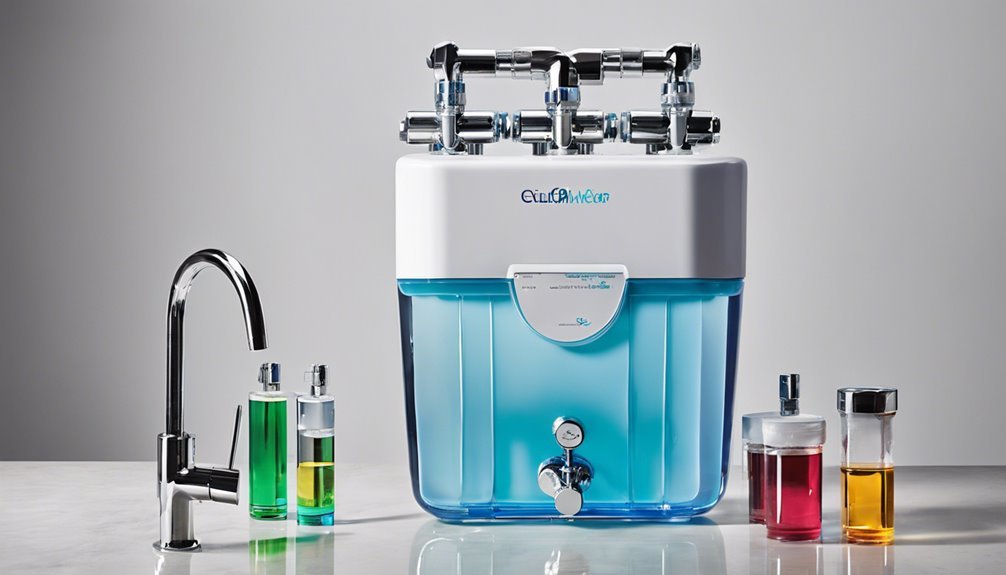What Dictates the Type of Water Softner?
Just as a tailor carefully selects fabric to craft the perfect suit, choosing the right water softener requires attention to various factors. You need to evaluate the hardness of your water, the size of your household, and even specific health needs. Different types, like ion exchange or salt-free options, cater to unique situations. But what about budget constraints or environmental concerns? Each element plays a role in your decision, yet the most critical aspect might still be lurking beneath the surface. What could that be?
Key Takeaways
- The hardness level of water, measured by calcium and magnesium concentrations, influences the selection of an appropriate softener type.
- Household size and water consumption patterns determine the capacity and efficiency needs of the water softener.
- Specific water quality issues, such as scale buildup or sodium sensitivity, dictate whether to choose salt-based or salt-free alternatives.
- Operating costs, including salt and maintenance expenses, impact the choice between traditional and advanced softening systems.
- Environmental considerations, like sodium pollution and waste generation, guide the selection of eco-friendly softening options.
Understanding Water Hardness
Understanding water hardness is essential for identifying the right water softener for your needs. Water hardness primarily results from the concentration of minerals, particularly calcium and magnesium, in your water supply.
The effects of water mineralization manifest in various ways, such as scale buildup in pipes and appliances, which can lead to costly repairs and reduced efficiency.
To accurately assess water hardness, you'll need to employ specific hardness measurement methods. Common techniques include titration, where a reagent is added to a water sample until a color change indicates hardness levels, and the use of test strips that provide a quick visual representation of mineral content.
Types of Water Softeners
When selecting a water softener, you'll encounter various types, each designed to address hardness in distinct ways.
Ion exchange softeners are the most common, using salt to replace hard minerals with sodium, while salt-free alternatives provide a different approach by conditioning water without the use of sodium.
Furthermore, magnetic water conditioners claim to alter the properties of minerals, offering yet another option for managing water hardness.
Ion Exchange Softeners
Ion exchange softeners are commonly used to effectively reduce water hardness by replacing calcium and magnesium ions with sodium or potassium ions. This process occurs in a resin bed, where resin types play an essential role in the efficiency and effectiveness of the softening process. Different resin types can influence factors like capacity, exchange rate, and longevity.
Here's a brief overview of some common resin types used in ion exchange softeners:
| Resin Type | Characteristics |
|---|---|
| Strong Acid Cation | High capacity; ideal for hard water conditions |
| Weak Acid Cation | Lower capacity; more efficient in low hardness |
| Strong Base Anion | Effective for removing organic matter and silica |
| Weak Base Anion | Used primarily for dealkalization |
When selecting an ion exchange softener, consider the specific resin type that aligns with your water quality requirements. The proper choice will enhance the overall performance and lifespan of your softener, ensuring you maintain ideal water quality in your home.
Salt-Free Alternatives
For those seeking alternatives to traditional ion exchange water softeners, salt-free systems provide a practical solution for reducing scale buildup without the use of sodium or potassium.
These systems typically employ a process called template-assisted crystallization, which transforms hard minerals into microscopic crystals that can't adhere to surfaces, thereby mitigating scale formation.
When considering salt-free systems, you'll want to evaluate the following benefits comparison:
- No Sodium Addition: Unlike traditional systems, salt-free alternatives don't increase sodium levels in your water, making them ideal for low-sodium diets.
- Lower Maintenance: These systems generally require less upkeep, as they don't need regular salt refills.
- Environmentally Friendly: By avoiding the discharge of salt into the environment, salt-free systems are more sustainable options.
- Retention of Essential Minerals: Salt-free systems maintain beneficial minerals in your water, contributing to overall health.
While salt-free systems may not completely eliminate hardness, they effectively reduce scale buildup, providing a viable option for those looking to balance efficiency and health considerations.
Magnetic Water Conditioners
Magnetic water conditioners offer an innovative approach to managing hard water by using magnetic fields to alter the properties of calcium and magnesium minerals. These devices are typically installed on your water pipes and create a magnetic field that affects the behavior of these minerals. Instead of removing hardness, magnetic water conditioners change the way calcium and magnesium interact with surfaces, potentially reducing scale formation.
In the domain of water treatment, these conditioners claim to prevent scale buildup in appliances and plumbing without the need for chemicals or salt. While users appreciate the low maintenance and eco-friendly aspects, the efficacy of magnetic systems remains debated. Research shows mixed results, with some studies indicating minimal impact on water hardness reduction.
When considering this option, it's essential to evaluate your specific needs. If you're facing severe hard water issues, traditional methods like ion exchange or reverse osmosis might be more effective.
However, if you're seeking a less invasive solution for minor hardness, magnetic water conditioners could be worth exploring. Ultimately, understanding how the magnetic field interacts with your water can help you make an informed decision about your water treatment options.
Household Size Considerations
When selecting a water softener, household size plays an essential role in determining the system's capacity and efficiency. You need to assess your household needs to guarantee that the system aligns with your family lifestyle. A proper fit won't only enhance the softener's effectiveness but also prolong its lifespan.
Here are four key factors to take into account:
- Number of Residents: Larger families typically require a higher capacity system to meet daily water demands.
- Water Usage Habits: If your family has a high consumption rate due to frequent laundry, showers, and dishwashing, you'll need a more robust system.
- Peak Usage Times: Identify when your household uses the most water. A softener with adequate flow rate can handle simultaneous demands.
- Appliance Dependence: Consider how many appliances rely on softened water, such as dishwashers and washing machines, which can influence your choice.
Budget and Cost Factors
When selecting a water softener, your budget and cost factors play an essential role in the decision-making process.
You'll need to take into account not only the initial purchase price but also the ongoing operating costs and maintenance expenses that can accumulate over time.
Understanding these financial components will help you choose a system that aligns with your economic goals while ensuring effective water treatment.
Initial Purchase Price
While the initial purchase price of a water softener can vary greatly based on the type and features, understanding the various cost factors is vital for making an informed decision. Your initial investment won't only depend on the model but also on its specifications and installation requirements.
Here are some key factors to take into account in your price comparison:
- Type of Softener: Traditional salt-based softeners often cost less upfront, while salt-free and dual-tank systems may have higher initial prices but offer advantages in efficiency.
- Capacity: A larger capacity softener typically incurs a higher price. It's important to match the capacity with your household's water usage.
- Features: Advanced features such as digital controls, self-cleaning systems, and additional filtration options can greatly impact the price.
- Brand Reputation: Well-known brands may charge a premium due to their perceived reliability and customer support, but sometimes you can find comparable alternatives at lower prices.
Operating Costs
Operating a water softener involves ongoing costs that can considerably affect your budget over time. These costs primarily include salt or potassium chloride, electricity, and water usage required for regeneration cycles. Conducting a cost analysis of these factors is essential for understanding the overall financial impact of your chosen system.
The operating efficiency of your water softener plays an important role in determining these costs. Higher efficiency models typically use less salt and water during regeneration, which can lead to lower utility bills. For instance, a system that regenerates less frequently will consume fewer resources, ultimately saving you money.
When evaluating operating costs, consider the frequency of regeneration cycles based on your household's water usage and the capacity of your softener. More frequent regeneration not only increases salt consumption but can also hike up water usage, which may be overlooked in your initial budget considerations.
Maintenance Expenses
Maintaining a water softener involves specific expenses that can impact your overall budget greatly.
To effectively manage these costs, it's vital to understand the following factors:
- Salt Expenses: Regularly purchasing salt for regeneration is a recurring cost. Depending on your water hardness, this can add up considerably.
- Maintenance Schedules: Following a proper maintenance schedule is essential to avoid larger issues. Routine checks can prevent expensive repairs down the line.
- Filter Replacement: Depending on your system, filter replacements might be necessary every few months. Staying on top of this can enhance the system's efficiency.
- Repair Costs: Should your water softener malfunction, repair costs can vary widely. It's advisable to set aside a budget for potential repairs or service calls.
Maintenance Requirements
To guarantee your water softener operates efficiently, regular maintenance is essential. Adhering to maintenance schedules guarantees that you prevent potential malfunctions and extend the lifespan of your system. Typically, you'll want to inspect your unit at least once a month, checking for salt levels and any signs of leaks.
Cleaning procedures are equally important; for instance, you should periodically clean the brine tank to eliminate any residue build-up that can impede performance. Using a diluted bleach solution can help sanitize the tank effectively.
Additionally, keep an eye on the resin beads, as they may require replacement every 5 to 10 years, depending on water quality and usage. Regularly backwashing the system eliminates accumulated particles, ensuring excellent flow and efficiency.
Don't forget to check the filters as well; they may need replacement based on your water hardness levels.
Water Usage Patterns
Understanding your water usage patterns is essential for optimizing the performance of your water softener. By analyzing your daily usage patterns, you can determine the right type of softener and its capacity, ensuring efficient operation.
Here are four key factors to take into account:
- Household Size: More residents typically lead to increased water consumption habits. Assess how many people live in your home to estimate total usage.
- Water-Intensive Appliances: Reflect on how often you use appliances like dishwashers and washing machines. Frequent use can greatly impact your daily water consumption.
- Irrigation and Outdoor Use: If you have a lawn or garden, outdoor watering can spike your water usage during specific times of the year. Factor this into your overall consumption.
- Peak Usage Times: Identify when your household uses the most water. This will help you understand when your softener needs to work hardest and adjust its settings accordingly.
Environmental Impact
The environmental impact of water softeners is an important consideration for homeowners looking to balance convenience with sustainability. Traditional salt-based systems can contribute to sodium pollution, which may exceed local environmental regulations and harm aquatic ecosystems. In contrast, alternative methods, such as potassium-based softeners or reverse osmosis systems, offer more environmentally friendly options.
To better understand the implications of different water softening methods, consider the following comparison:
| Method | Environmental Impact | Sustainability Practices |
|---|---|---|
| Salt-based | High sodium discharge | Limited recycling of salt |
| Potassium-based | Lower sodium, biodegradable waste | More sustainable but costlier |
| Magnetic/Template | Minimal ecological footprint | Potentially less effective |
| Reverse Osmosis | Wastewater generation | High efficiency but energy-intensive |
| Dual-tank | Reduced salt waste | Improved efficiency with proper use |
Installation Options
When considering water softeners, installation options play a significant role in determining the overall effectiveness and efficiency of the system.
You'll encounter various installation methods, each with its own set of benefits and challenges. Understanding these can help you make an informed decision.
- DIY Installation: If you're handy, you might opt for a do-it-yourself approach. This can save costs but may introduce installation challenges if you lack plumbing experience.
- Professional Installation: Hiring a plumber guarantees that the system is installed correctly, minimizing potential issues. This method is often recommended for complex setups.
- Salt-Based Systems: These typically require a drain and may involve more extensive plumbing modifications, presenting installation challenges.
- Salt-Free Systems: Easier to install, these systems often require less modification to your plumbing. However, their effectiveness varies based on water hardness.
Evaluating these installation options won't only affect your immediate setup but also the long-term functionality of your water softener.
Consider your specific needs and the complexities of each installation method before making a decision.
Frequently Asked Questions
Can Water Softeners Improve the Taste of Drinking Water?
Water softeners can enhance taste improvement by adjusting the mineral balance in your water. By reducing hardness minerals like calcium and magnesium, they create a smoother, cleaner flavor, making your drinking experience more enjoyable and palatable.
Do Water Softeners Require Electricity to Operate?
Water softeners can be like silent guardians, transforming hard water into a smoother flow. Depending on the softener types, some require electricity usage, while others operate without power, relying solely on natural processes for efficiency.
How Long Do Water Softeners Typically Last?
Water softeners typically last 10 to 15 years, depending on usage and maintenance. To extend your water softener lifespan, follow maintenance tips like regular cleaning, salt replenishment, and monitoring for leaks or malfunctions.
Can Water Softeners Be Used in Well Water Systems?
You've got a well water system? You can use water softeners, but consider well water considerations like mineral content and flow rate. Make certain the softener compatibility matches your system for best performance and longevity.
What Are the Signs That a Water Softener Needs Replacement?
You'll notice replacement indicators like decreased water flow, persistent hard water spots, or unusual noises. Regular maintenance tips include checking the salt levels and cleaning the resin, ensuring peak performance before considering replacement.
Conclusion
Choosing the right water softener is like steering through a winding river; it requires careful consideration of various factors. By evaluating water hardness, household size, budget, maintenance needs, and environmental impacts, you can find a solution that flows seamlessly into your lifestyle. Whether you opt for an ion exchange system or a salt-free alternative, understanding these elements helps guarantee your choice not only meets your practical needs but also harmonizes with your personal values.







